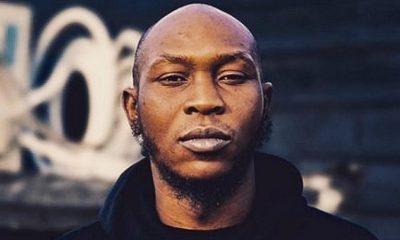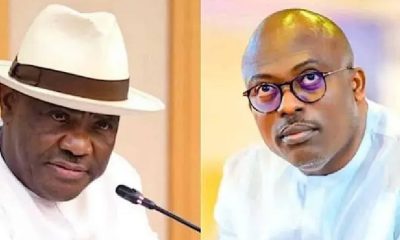Economy
FG announces $10bn diaspora fund to attract investment

The federal government has announced plans to set up a $10 billion diaspora fund to attract investment from citizens.
In a post on X on Thursday, Doris Uzoka-Anite, minister of industry, trade and investment, said the federal government is seeking bids from asset managers to set up the fund.
The initiative, the minister said, is expected to support critical sectors including infrastructure, health care and education to grow the economy.
Uzoka-Anite said the fund will be guided by an advisory board comprising limited partners, calling on eligible firms to express their interest in its management.
“The fund is part of broader efforts to strengthen ties between Nigeria and its diaspora, promote national development,” she said.
“Objective of the Nigeria diaspora fund; The fund will be managed by Fund Managers that satisfy the criteria set out in the Expression Of Interest (EOI). The Fund manager will propose Fund structures that will focus on various sectors and stages of investments.
“Subject to the preferences indicated by fund managers, the fund will contain multiple investment platforms designed to offer investors different mechanisms for participating in Nigeria’s economic transformation.
“This fund is a way of encouraging remittances, attracting investments and facilitating philanthropic endeavors aimed at supporting various sectors such as infrastructure, healthcare, education and entrepreneurship in Nigeria.
“The launch of the diaspora fund will serve as an opportunity to raise interest in and awareness of the fund: towards mobilizing capital investment from the diaspora community.”
Uzoka-Anite said the fund managers will be responsible for designing investment platforms focused on the aforementioned sectors.
“The fund presents an opportunity for diaspora investors to contribute meaningfully to Nigeria’s socio-economic advancement,” Uzoka-Anite said.
“As part of this process, a committee was set up to design and develop the structure for a diaspora fund.
“Various stakeholders in the capital markets, investment community and diaspora investors were engaged and also consulted on the establishment of the $10 billion Nigeria Diaspora Fund.
“The expected investment period is for three to five years with follow on investments thereafter. The life of the fund will be 10 years (extendable by 2 years).
“The launch of the diaspora fund is poised to raise awareness and mobilize capital investment from the diaspora community, marking a significant milestone in Nigeria’s journey towards sustainable economic prosperity.”
Uzoka-Anite also noted that the proposed asset offering could take the shape of infrastructure, credit, and venture capital funds.
The minister said interested firms, including joint ventures and greenfield funds, are encouraged to apply by May 6.
On April 3, the federal government said it plans to start issuing domestic foreign currency-denominated bonds from the second quarter (Q2) of 2024.
The federal government, on April 21, said plans are afoot to issue a diaspora bond to boost remittances.
Economy
75.5% of rural Nigerians now live below poverty line — World Bank

The World Bank has disclosed that a staggering 75.5 per cent of rural Nigerians are now living below the poverty line, reflecting deepening hardship in the country’s hinterlands.
This was revealed in the Bank’s April 2025 Poverty and Equity Brief for Nigeria, which paints a grim picture of worsening economic hardship, widening inequality, and persistent underdevelopment across much of the nation.
While poverty is widespread among urban populations, the report emphasised that the situation is significantly worse in rural areas, where economic stagnation, high inflation, and insecurity have exacerbated living conditions.
“Based on the most recent official household survey data from Nigeria’s National Bureau of Statistics, 30.9 per cent of Nigerians lived below the international extreme poverty line of $2.15 per person per day in 2018/19 before the COVID-19 pandemic,” the report stated.
The report also highlighted Nigeria’s enduring regional disparities. “Nigeria remains spatially unequal. The poverty rate in northern geopolitical zones was 46.5 per cent in 2018/19, compared with 13.5 per cent for southern ones. Inequality measured by the Gini index was estimated at 35.1 in 2018/19.
“Nigeria’s Prosperity Gap — the average factor by which individuals’ incomes must be multiplied to attain a prosperity standard of $25 per day for all — is estimated at 10.2, higher than most peers.”
Despite successive policy interventions, these figures underscore a persistent economic divide across the country.
The report’s demographic analysis found that children aged 0 to 14 years had a poverty rate of 72.5 per cent, reflecting the scale of deprivation among the youngest segment of the population.
Gender disparities were also observed, with 63.9 per cent of females and 63.1 per cent of males classified as poor under the $3.65 per day lower-middle-income threshold.
Education emerged as a significant determinant of poverty, with Nigerians lacking formal education experiencing a poverty rate of 79.5 per cent. This contrasts with 61.9 per cent for those with primary education and 50.0 per cent for secondary school graduates. Only 25.4 per cent of those with tertiary education were considered poor.
The report also drew attention to multidimensional poverty indicators, which further reflect widespread deprivation.
According to the World Bank, about 30.9 per cent of Nigerians live on less than $2.15 daily, 32.6 per cent lack access to limited-standard drinking water, 45.1 per cent do not have limited-standard sanitation, and 39.4 per cent have no electricity.
Education access remains a challenge, with 17.6 per cent of adults yet to complete primary education, and 9.0 per cent of households reporting at least one school-aged child not enrolled in school.
The report noted that even before the COVID-19 pandemic, efforts to reduce extreme poverty had largely stalled.
“Before COVID-19, extreme poverty reduction had almost stagnated, dropping by only half a percentage point annually since 2010. Living standards of the urban poor are hardly improving, and jobs that would allow households to escape poverty are lacking,” the report read.
Although the World Bank acknowledged recent economic reforms aimed at stabilising Nigeria’s macroeconomic outlook, it warned that persistently high inflation continues to undermine household purchasing power, particularly in urban areas where incomes have not kept pace with rising costs.
In light of the worsening situation, the Bank called for urgent policy action to shield vulnerable groups from inflationary shocks and to drive job creation through more productive economic activities.
Economy
Naira Records Marginal Decline Against Dollar at Official Market

The Nigerian naira experienced a mild drop in value on Friday, closing at ₦1,602.18 per dollar in the official foreign exchange market, based on figures released by the Central Bank of Nigeria (CBN).
This marks a decrease of ₦5.49 from the rate of ₦1,596.69 recorded on April 30, the last trading day before the May 1 Workers’ Day holiday—indicating a depreciation of approximately 0.34%.
Earlier in the week, from Monday to Wednesday, the naira remained relatively stable, exchanging at ₦1,599.95, ₦1,599.71, and ₦1,596.69 respectively.
Although the local currency showed some consistency mid-week, it wrapped up the week with a loss, following a sligh dip of 0.02% at the beginning of the week
Economy
Black Market Dollar hits N1,610 Amid Economic quagmire

What is the Dollar to Naira Exchange Rate in the Black Market (Also Known as the Parallel Market or Aboki FX)?
Below is the black market exchange rate for the U.S. dollar to the Nigerian naira as of Thursday, May 1, 2025. These are the typical rates at which you can exchange dollars for naira:
Dollar to Naira Black Market Exchange Rate (May 1, 2025):
At the Lagos Parallel Market, also referred to as the black market, Bureau De Change (BDC) operators are buying dollars at ₦1,602 and selling at ₦1,610, according to market sources.
Please note: The Central Bank of Nigeria (CBN) does not recognize or endorse transactions conducted on the parallel market. The CBN advises individuals and businesses seeking foreign exchange to use official banking channels.
-

 Entertainment24 hours ago
Entertainment24 hours agoHow I narrowly escaped death in U.S hotel room – Seun Kuti
-

 Opinion1 hour ago
Opinion1 hour agoRIVERS, WIKE, FUBARA, AND THE WAY FORWARD
-

 News21 hours ago
News21 hours agoReps Minority Caucus condemns unlawful detention of VDM, demands his immediate release
-

 News11 hours ago
News11 hours agoMinistry denies awarding N13bn contracts without due process
-

 News11 hours ago
News11 hours agoFULL STEPS: How to check 2025 JAMB results
-

 News23 hours ago
News23 hours agoWATCH Your family Lawyer’s last episode on how to end marriage
-

 News5 hours ago
News5 hours agoVDM may be released on Tuesday
-

 News11 hours ago
News11 hours agoCourt halts Abuja multi-million naira market project





